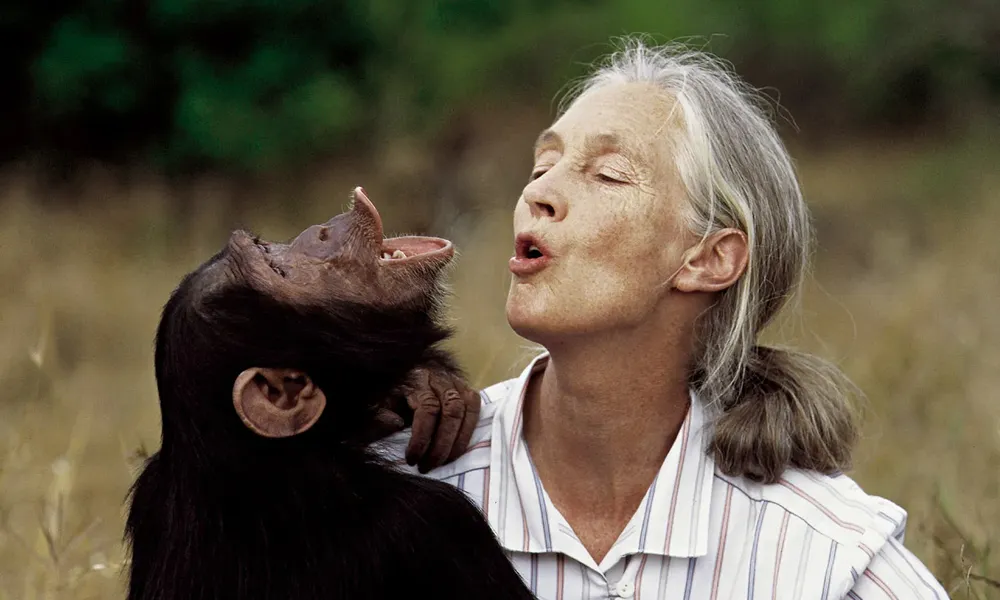Dame Jane Goodall’s passing on 1 October 2025 has been met with a global outpouring of grief and admiration, with media tributes calling her “a true hero for the planet” and saluting her as a “tireless advocate” for wildlife and ecosystems, AP reported.
Born in London in 1934, Jane Goodall rose from a childhood fascination with animals to become the world’s most renowned primatologist. At 26, under the mentorship of Louis Leakey, she began her pioneering work at Gombe Stream in Tanzania. While living among chimpanzees in Africa decades ago, Goodall documented them doing activities previously believed to be exclusive to humans. Her observations and subsequent magazine and documentary appearances in the 1960s transformed how the world perceived not only humans’ closest living biological relatives but also the emotional and social complexity of all animals, while propelling her into the public consciousness.
Her discovery that chimpanzees make and use tools upended scientific orthodoxy and changed the way humanity views itself in relation to the animal kingdom. She went on to found the Jane Goodall Institute in 1977 and launched the global youth program Roots & Shoots in 1991, empowering millions to act for conservation.
Respect across the globe
UN Secretary-General António Guterres said in a statement carried by The Journal that he was “deeply saddened to learn about the passing of Jane Goodall, our dear Messenger of Peace,” praising her for leaving “an extraordinary legacy for humanity and our planet.”
The World Wildlife Fund, in a press release quoted by WWF.org, called her “a force for good,” with CEO Carter Roberts noting that she had inspired millions by “bringing nature into classrooms” and urging others to find “the same kind of courage and determination to save what we love most.”
Former U.S. President Joe Biden paid tribute, saying her “message of hope… mobilised a global movement to protect the planet,” according to WTOP. Canadian former Prime Minister Justin Trudeau wrote on X that he was “heartbroken” at her passing, adding that “her wisdom and compassion will live on in every act of conservation,” ABC News reported.
Animal rights group PETA said, as cited by The Middletown Press, that Goodall “forever changed the way we view our fellow animals … we could always count on her to be on the animals’ side.” Broadcaster and naturalist Chris Packham told WTOP she had “used her voice calmly to speak up for life on Earth,” adding that “Jane just died on the job… protecting life on Earth.”

UN SG deeply saddened: “Our dear Messenger of Peace”
Words to Inspire Generations
Even in her final interviews, Goodall warned of humanity’s fragility, telling Vox in April 2025: "We’re destroying the planet … we have a window of time … Humans are not exempt from extinction." Yet she also pointed to nature’s resilience, saying that "places we have destroyed can once again support life … endangered species can be given a second chance." She urged her audiences to "treat every day of the year as Earth Day."
Throughout her life, Goodall stressed that "the greatest danger to our future is apathy." She believed in the responsibility of each person to act, reminding us that "what you do makes a difference, and you have to decide what kind of difference you want to make."
Her compassion extended beyond science to a philosophy of kinship with all living beings. "The least I can do is speak out for those who cannot speak for themselves," she said of the animals she devoted her life to protecting.
Above all, she left a message of hope: "Every individual matters. Every individual has a role to play. Every individual makes a difference." It was this conviction that shaped her lifelong mission: "Only if we understand, can we care. Only if we care, will we help. Only if we help, shall all be saved."
Her words, as much as her discoveries, remain her enduring gift to the planet she spent a lifetime defending.
